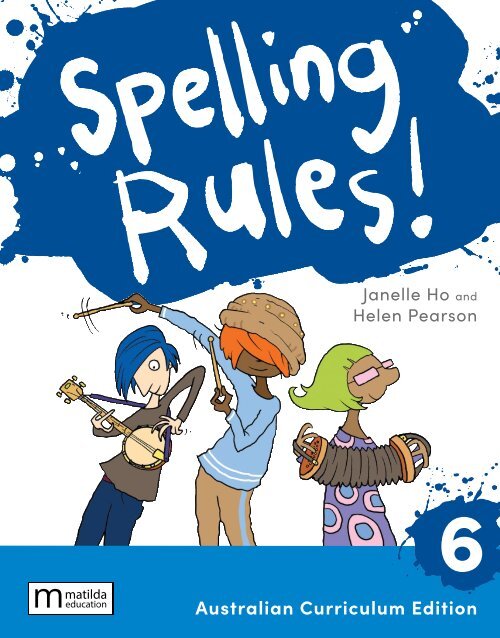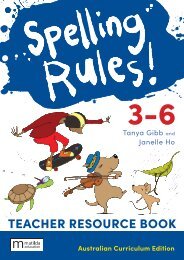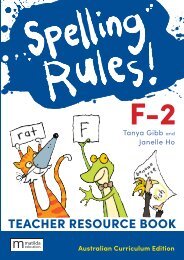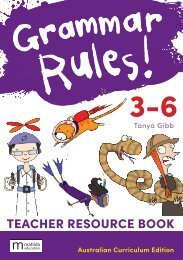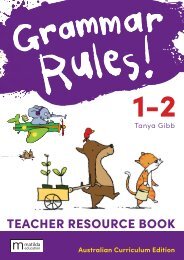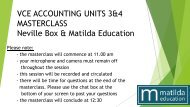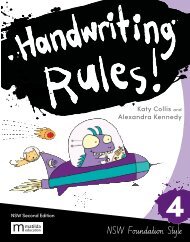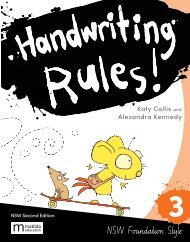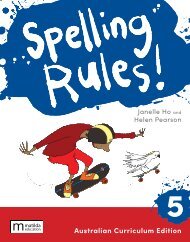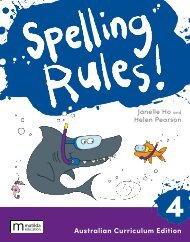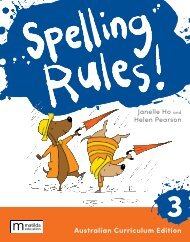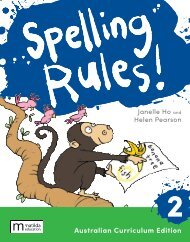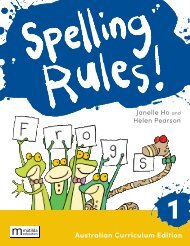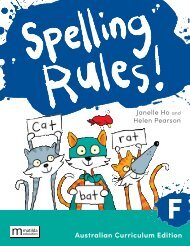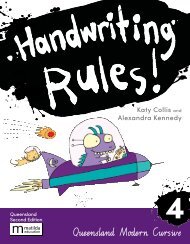Spelling Rules! 6 Australian Curriculum 3e sample/look inside
Create successful ePaper yourself
Turn your PDF publications into a flip-book with our unique Google optimized e-Paper software.
Janelle Ho and<br />
Helen Pearson<br />
6<br />
<strong>Australian</strong> <strong>Curriculum</strong> Edition
Janelle Ho and<br />
Helen Pearson<br />
STUDENT<br />
BOOK<br />
6<br />
<strong>Australian</strong> <strong>Curriculum</strong> Edition<br />
Name:<br />
Class:
Contents<br />
Scope and Sequence.......................................................................... 3<br />
Note to Teachers and Parents.......................................................... 4<br />
Units 1–35.............................................................................................. 6–75<br />
List Words in Unit Order..................................................................... 76<br />
List Words in Alphabetical Order..................................................... 78<br />
<strong>Spelling</strong> <strong>Rules</strong> and Tips...................................................................... 80<br />
SLLURP<br />
SLLURP summarises the spelling strategies that you can use to learn new words.<br />
Say<br />
Listen<br />
Look<br />
Understand<br />
Remember<br />
Practise<br />
Say the word carefully and slowly to yourself.<br />
Listen to how each part of the word sounds in sequence.<br />
Look at the patterns of letters in the word and the shape of the word.<br />
Understand rules, word meanings and word origins.<br />
Remember all the similar words you can already spell and relate<br />
this knowledge to any new word.<br />
Practise writing the word until it is firmly fixed in your long-term<br />
memory.<br />
2 <strong>Spelling</strong> <strong>Rules</strong>! Student Book 6 (ISBN 9780655092728) © Janelle Ho, Helen Pearson
Scope and Sequence<br />
SKILL FOCUS<br />
UNIT Letter patterns Morphology Etymology<br />
1<br />
2<br />
3<br />
ge, gi, gy, dge, j<br />
-ion: adding<br />
to silent e, ve,<br />
lve, be<br />
-ion: adding to<br />
ss, nd, de, t<br />
Homophones/<br />
Confusing<br />
words<br />
Topic<br />
words<br />
words ending in a<br />
4<br />
vowel sound<br />
suffixes<br />
homographs: government<br />
5<br />
premier, cabinet,<br />
minister<br />
6 REVISION<br />
7<br />
8<br />
9<br />
-ity: adding to<br />
able, ible<br />
syn-, sym-, co-,<br />
com-, con-,<br />
cor-, colme<br />
(dimension, immense,<br />
diameter, perimeter,<br />
thermometer, semester)<br />
optos, athlon, medeor<br />
homograph:<br />
coach<br />
occupations<br />
genre, geometry, genealogy, gyrate, indulge, grudge, judgement, jubilant, jest,<br />
juvenile, junction, hijack, prejudice, adjacent, adjoining<br />
corruption, exhibition, exception, restriction, distinction, desperation,<br />
cooperation, alliteration, devastation, hallucination, deception, evolution,<br />
resolution, revolution, prescription<br />
possession, obsession, extension, suspension, expansion, corrosion, invasion,<br />
exclusion, collision, persuasion, provision, admission, submission, inversion,<br />
diversion<br />
flee, pursue, statue, venue, cocoa, mosquito, rodeo, eerie, simile, guarantee,<br />
refugee, committee, verandah, debut, alibi<br />
government, parliament, cabinet, politician, minister, senator, representatives,<br />
governor, premier, opposition, president, election, democracy, monarchy,<br />
federal<br />
synthesise, idiosyncrasy, syndrome, sympathy, symbiotic, symmetry, coherent,<br />
cohesive, coincidence, coordinate, accommodate, commotion, compensate,<br />
correlate, collaborate<br />
coach, pilot, lifeguard, locksmith, optician, treasurer, choreographer, courier,<br />
tutor, sculptor, surgeon, analyst, pharmacist, athlete, paramedic<br />
stability, durability, probability, acceptability, compatibility, predictability,<br />
variability, changeability, irritability, visibility, flexibility, vulnerability, accessibility,<br />
invincibility, eligibility<br />
10<br />
affixes: -logy environment environment, rainforest, pollution, greenhouse, climate, recycle, ozone, ecology,<br />
irrigation, conservation, deforestation, flora, fauna, sustainable, atmosphere<br />
bio-, zoo-, terra<br />
biology, biography, autobiography, biodegradable, microbe, zoology,<br />
11<br />
anthropo-,<br />
geo-, -graphy<br />
zoophobia, anthropology, philanthropy, anthropomorphism, geology,<br />
geography, terrace, terrain, terrestrial<br />
12 REVISION<br />
13<br />
ior, ian, iar -ity sen prior, senior, superior, exterior, posterior, deteriorate, median, alliance, valiant,<br />
pliant, ruffian, peculiar, plagiarise, matriarch, diarrhoea<br />
spek, sequi<br />
telescope, periscope, aspect, suspect, auspicious, conspicuous, despise,<br />
14<br />
despicable, spectacle, speculate, sequence, sequel, execute, prosecute,<br />
consecutive<br />
-ous<br />
wondrous, humorous, perilous, miraculous, Indigenous, cantankerous, studious,<br />
15<br />
gregarious, rebellious, voracious, precarious, instantaneous, spontaneous,<br />
righteous, ambiguous<br />
16<br />
nova, vox, notare,<br />
novel, novelty, novice, innovate, innovation, vocal, vocabulary, advocate,<br />
reminisci<br />
vociferous, invoke, provoke, notice, notify, annotate, reminisce<br />
-ic science solution, toxic, method, experiment, acid, alkaline, temperature, evaporate,<br />
17<br />
thermometer, theory, equipment, chemical, microscope, hypothesis,<br />
laboratory<br />
18 REVISION<br />
-ation, -ition<br />
definition, repetition, condemnation, alteration, interpretation, continuation,<br />
19<br />
declaration, cancellation, inflammation, explanation, exclamation, variation,<br />
identification, notification, clarification<br />
20<br />
21<br />
22<br />
23<br />
ary, ery, ory -ary, -ery, -ory stationery/<br />
stationary<br />
phone, onyma, patheia,<br />
magnus<br />
homographs:<br />
organ, appendix<br />
medicine<br />
a-, ab-, ad-,<br />
ac-<br />
military, anniversary, solitary, documentary, contrary, crockery, confectionery,<br />
surgery, nursery, treachery, forgery, sensory, contradictory, category,<br />
exploratory<br />
anew, akin, avert, abduct, abhor, abnormal, abolish, abrupt, abuse, adhere,<br />
adolescent, adversary, accelerate, accumulate, acquit<br />
symphony, phonetic, microphone, cacophony, synonym, antonym, pseudonym,<br />
anonymous, empathy, telepathy, majesty, majority, magnify, magnificent,<br />
magnanimous<br />
medicine, bacteria, virus, pregnant, fracture, organ, influenza, abdomen,<br />
intestine, capsule, appendix, vaccination, immunisation, pneumonia,<br />
stethoscope<br />
24 REVISION<br />
25<br />
cy -cy, ob- cyclone, cynical, cyberspace, urgency, accuracy, literacy, numeracy, privacy,<br />
pregnancy, diplomacy, adequacy, delicacy, obstinacy, buoyancy, legacy<br />
26<br />
double consonants territory, graffiti, suppress, pallor, assassin, apparatus, millennium, succulent,<br />
eccentric, gimmick, dilemma, pinnacle, abbreviation, etiquette, intermittent<br />
27<br />
sub-, suc-, suf-,<br />
sup-, sursubconscious,<br />
sublime, submerge, subordinate, subside, substandard,<br />
subterranean, subtle, succinct, succumb, suffocate, suppose, supplement,<br />
surreptitious, suspend<br />
28<br />
multiple affixes<br />
incomprehension, unmanageable, discontinued, ignorance, invisibility,<br />
irrational, immobile, immovable, noticeably, symmetrical, unintentionally,<br />
uncritically, reversible, illegibly, predestined<br />
29<br />
suffixes, plurals non-English words money currency, exchange, pound, euro, rupiah, baht, allowance, financial, budget,<br />
discount, subsidy, purchase, expenditure, millionaire, treasury<br />
30 REVISION<br />
sce, sci<br />
ascend, descend, transcend, obscene, adolescent, fluorescent, iridescent,<br />
31<br />
effervescent, miscellaneous, susceptible, convalesce, scintillate, conscience,<br />
conscientious, resuscitate<br />
32<br />
odd-<strong>look</strong>ing onomatopoeia, asphalt, amateur, havoc, jargon, anemone, flummox, sleuth,<br />
words nuisance, naive, pizzazz, eclipse, impromptu, labyrinth, conundrum<br />
33<br />
non-English words<br />
trek, snorkel, mammoth, deluxe, carnival, rampage, maestro, berserk,<br />
gruesome, cologne, abseil, souvenir, gourmet, silhouette, entrepreneur<br />
34<br />
astro<br />
space and<br />
time<br />
35 REVISION<br />
<strong>Spelling</strong> <strong>Rules</strong>! Student Book 6 (ISBN 9780655092728) © Janelle Ho, Helen Pearson<br />
WORD LIST<br />
asteroid, astronaut, astronomy, comet, galaxy, meteor, orbit, dimension,<br />
futuristic, chronology, medieval, terrestrial, archaeologist, palaeontology,<br />
Renaissance<br />
3
<strong>Spelling</strong> <strong>Rules</strong>!<br />
Note to teachers and parents<br />
Some students are natural spellers. But the vast majority of students need formal, systematic and sequential<br />
instruction about the way spelling works and the strategies they can use to become independent, confident<br />
spellers and spelling risk-takers.<br />
The <strong>Spelling</strong> <strong>Rules</strong>! program is based on sound linguistic and pedagogical theory. It is informed by research into<br />
how students of different ages acquire and apply spelling skills, and how those skills move from the working to<br />
the long-term memory. The program closely follows the <strong>Australian</strong> English curriculum. <strong>Australian</strong> <strong>Curriculum</strong>: English<br />
references are provided in the Teacher Resource Books. The program consists of seven student books, fully<br />
supported by two Teacher Resource Books.<br />
Each student book contains units of work, with each unit designed to be used over<br />
the course of a week. The content of each unit simultaneously develops new skills<br />
and reinforces skills from previous units and earlier books. The introduction of new<br />
letter patterns is logically sequenced and takes into account both frequency of use<br />
and complexity. Where appropriate, topic words from other curriculum areas such<br />
as mathematics, science and social sciences are included. When spelling rules are<br />
introduced, only known sounds and letter patterns are used so that students focus<br />
on one skill at a time. Regular revision units enable teachers to assess student<br />
progress and reinforce key rules and patterns from previous units.<br />
<strong>Spelling</strong> knowledge<br />
Learning to spell involves developing different kinds of spelling knowledge. In many<br />
cases, particularly in the upper grades, more than one kind of knowledge is called<br />
upon at a time. As they work through the activities in each <strong>Spelling</strong> <strong>Rules</strong>! unit,<br />
students will develop:<br />
T Kinaesthetic knowledge – the physical feeling when saying different<br />
sounds and words, and when writing the shapes of letters and words<br />
T Phonological knowledge – how a word sounds and the patterns<br />
of sounds in words<br />
T Visual knowledge – how letters and words <strong>look</strong> and the visual<br />
patterns in words<br />
T Morphemic knowledge – the meaning or function of words or<br />
parts of words<br />
T Etymological knowledge – the origins and history of words and<br />
the effect this has on spelling patterns.<br />
Icons used in Student Book 6<br />
This icon highlights useful spelling rules. The rule is always introduced the first time<br />
students will need it to complete an activity. There is also a handy summary of important<br />
rules on page 80.<br />
This icon tells students that a special clue or hint is provided for an activity. It may be<br />
a spelling, grammar or punctuation convention, or a definition of a useful term.<br />
4 <strong>Spelling</strong> <strong>Rules</strong>! Student Book 6 (ISBN 9780655092728) © Janelle Ho, Helen Pearson
Student Book 6<br />
Units of work<br />
Student Book 6 contains 35 weekly units of work. See the Scope and Sequence chart on page 3 for more<br />
information. Each revision unit gives students an opportunity to self-assess.<br />
Word lists<br />
In Student Book 6 each unit (except Revision) has a list of spelling words. The core words in the lists have been chosen<br />
to support the learning focus and strategies being taught in the unit.<br />
<strong>Spelling</strong> lists enable a spelling element to be focused on, and provide sufficient examples to consolidate the<br />
teaching point. Topic words come from other curriculum areas, such as mathematics and social sciences. In addition,<br />
homophones and words that are easily confused with each other are explained and practised.<br />
SLLURP<br />
Each word list begins with a reminder for students to SLLURP. SLLURP summarises the strategies that will help<br />
spelling move from students’ working memory to their long-term memory. These strategies are provided on page 2,<br />
for easy reference.<br />
Unit at a glance<br />
SLLURP reminds students<br />
about strategies they can use<br />
to learn the words<br />
List words support the<br />
learning of the spelling<br />
focus for the unit. Words<br />
come from across the<br />
curriculum<br />
Space to practise list<br />
words; to write theme<br />
words, personal words<br />
or extension words; or<br />
to practise other words<br />
with the same spelling<br />
focus. Adapt this section<br />
to suit the needs of<br />
your class<br />
19<br />
Say Listen Look Understand Remember Practise<br />
2<br />
3<br />
definition<br />
repetition<br />
condemnation<br />
alteration<br />
interpretation<br />
continuation<br />
declaration<br />
cancellation<br />
inflammation<br />
explanation<br />
exclamation<br />
variation<br />
identification<br />
notification<br />
clarification<br />
Complete the tables.<br />
Flocculation is what happens when:<br />
a music makes you sway from side to side<br />
b flocks of sheep gather<br />
c things are formed in a woolly mass<br />
inflame classify define<br />
I<br />
Complete the table.<br />
verb<br />
satisfy<br />
define<br />
alter<br />
noun<br />
cancellation<br />
declaration<br />
exclamation<br />
repetition<br />
continuation<br />
base word add ion base word add ion<br />
apply<br />
multiply<br />
identify<br />
Write a list word.<br />
This list word has a silent letter in its base word.<br />
notify<br />
magnify<br />
clarify<br />
This list word doubles the final consonant in its base word.<br />
4<br />
Write the noun form for each verb. Say each pair aloud.<br />
What happens to the stress on the final syllable?<br />
Unit banner<br />
features the spelling<br />
focus in the context<br />
of an amazing fact<br />
To add ion to a base word ending in y,<br />
change the y to i and add cation.<br />
multiply multiplication<br />
Some exceptions: vary variation<br />
satisfy satisfaction<br />
ATM machine HIV virus PIN number<br />
42 <strong>Spelling</strong> <strong>Rules</strong>! Student Book 6 (ISBN 9780655092728) © Janelle Ho, Helen Pearson<br />
<strong>Spelling</strong> <strong>Rules</strong>! Student Book 6 (ISBN 9780655092728) © Janelle Ho, Helen Pearson<br />
43<br />
5<br />
convert<br />
converse<br />
6<br />
7<br />
8<br />
Answer: c<br />
Convert and converse both form a noun ending in ion. Write the nouns, then use each one in a<br />
sentence. Use a dictionary if you need help.<br />
Use the clues to complete the puzzle.<br />
I<br />
I<br />
I<br />
I<br />
I<br />
I<br />
I<br />
O N<br />
O N<br />
O N<br />
O N<br />
O N<br />
O N<br />
O N<br />
all talk and no<br />
learning with a tutor<br />
The judge’s<br />
antonym of acceptance<br />
What is odd about these phrases that contain an abbreviation?<br />
is final.<br />
what someone makes when they accuse you of something<br />
What is your<br />
for being late?<br />
document that informs you of something<br />
An abbreviation is either a short form of a word, or the first letter of each word in a phrase.<br />
government govt United States of America USA<br />
An acronym is a special kind of abbreviation. In an acronym, the abbreviation is<br />
pronounced as a whole word.<br />
AIDS PIN<br />
Write the abbreviated name of each organisation. Circle the abbreviations that are acronyms.<br />
United Nations Educational, Scientific and Cultural Organization<br />
International Union for Conservation of Nature<br />
Royal Society for the Prevention of Cruelty to Animals<br />
North Atlantic Treaty Organization<br />
<strong>Spelling</strong> focus<br />
highlighted in<br />
colour<br />
National Aeronautic and Space Administration<br />
International Crime Police Organization<br />
Sequenced<br />
activities – each<br />
activity focuses on<br />
a specific spelling<br />
strategy. Some<br />
activities refer to<br />
content in other<br />
curriculum areas<br />
<strong>Spelling</strong> tips and<br />
rules introduced<br />
when students need<br />
them to complete an<br />
activity<br />
<strong>Spelling</strong> <strong>Rules</strong>! Teacher Resource Book 3-6<br />
Full teacher support for Student Book 6 is provided by <strong>Spelling</strong> <strong>Rules</strong>! Teacher Resource Book 3–6. Here you will<br />
find valuable background information about spelling development and spelling knowledge, along with practical<br />
resources, such as:<br />
T teaching tips for every unit in Student Book 6 T guidelines for assessment and diagnosis of errors<br />
T extra word lists<br />
T activities to support struggling spellers<br />
T strategies for teaching spelling<br />
T worthwhile extension for more able spellers.<br />
<strong>Spelling</strong> <strong>Rules</strong>! Student Book 6 (ISBN 9780655092728) © Janelle Ho, Helen Pearson<br />
5
1<br />
Julienne describes:<br />
a the naming of a baby girl<br />
b something cut into thin strips<br />
c plans for a party in July<br />
Say Listen Look Understand Remember Practise<br />
genre<br />
geometry<br />
genealogy<br />
gyrate<br />
indulge<br />
grudge<br />
judgement<br />
jubilant<br />
jest<br />
juvenile<br />
junction<br />
hijack<br />
prejudice<br />
adjacent<br />
adjoining<br />
I<br />
2<br />
Circle the letter g if it has a soft sound.<br />
gentle energy goalpost<br />
gigantic gymnasium genius<br />
ginger gear gallop<br />
grudge genealogy giddy<br />
Use some of the letters in each word to make new<br />
words with a hard g sound.<br />
passenger<br />
urgent<br />
gyrate<br />
pledge<br />
genre<br />
geometry<br />
g usually has a soft sound when it is<br />
followed by e, i or y.<br />
Prefixes and suffixes are known as affixes.<br />
3<br />
Break each word into its base word and affix.<br />
geometric = + jester = +<br />
adjoining = + + disadvantage = +<br />
4<br />
Use the list words as verbs, nouns and adjectives. You may need to add or delete an affix. Try not to<br />
use the same word more than once.<br />
verbs<br />
nouns<br />
adjectives<br />
to<br />
a plane<br />
the book’s<br />
a<br />
champ<br />
to<br />
wildly<br />
a traffic<br />
an<br />
room<br />
to<br />
in dessert<br />
to hold a<br />
a<br />
pattern<br />
to<br />
harshly<br />
treated with<br />
a<br />
animal<br />
6 <strong>Spelling</strong> <strong>Rules</strong>! Student Book 6 (ISBN 9780655092728) © Janelle Ho, Helen Pearson
5<br />
Write two list words that are synonyms.<br />
6<br />
Complete the passage with words beginning with j.<br />
In the <strong>Australian</strong><br />
system, anybody accused of a crime<br />
is defended by a lawyer. In court, there is a<br />
, who<br />
knows the law and controls what happens in the courtroom. A group of<br />
ordinary people called the<br />
makes the final decision<br />
about whether the defendant is guilty. If not guilty, the accused is free to<br />
leave. If guilty, the judge makes a<br />
about an appropriate<br />
punishment.<br />
7<br />
Write words with a j or soft g sound. The first letter is given.<br />
The contents of the box are f<br />
. Please carry it carefully.<br />
Mum made an a<br />
to the length of my pyjamas so my little brother could<br />
wear them.<br />
I am of a<br />
height, but my sister is tall for her age.<br />
Karl longed to travel as a p<br />
on the Trans-Siberian railway.<br />
My father has a cat a<br />
. They make him sneeze.<br />
I issued a c to replay the game because I wanted r .<br />
Dad tells us that holding a g<br />
can make one ill.<br />
My grandparents tested their g<br />
and found that they have Dutch ancestors!<br />
8<br />
Which genre of books do you most like to read? Write a paragraph explaining why.<br />
Answer: b<br />
<strong>Spelling</strong> <strong>Rules</strong>! Student Book 6 (ISBN 9780655092728) © Janelle Ho, Helen Pearson<br />
7
2<br />
Fluctuation occurs when:<br />
a fruit becomes rotten<br />
b a flock of ducks flies in formation<br />
c something changes constantly<br />
Say Listen Look Understand Remember Practise<br />
I<br />
Write the two list words that are different by only<br />
one letter.<br />
corruption<br />
exhibition<br />
exception<br />
restriction<br />
distinction<br />
desperation<br />
cooperation<br />
alliteration<br />
devastation<br />
hallucination<br />
deception<br />
evolution<br />
resolution<br />
revolution<br />
prescription<br />
2<br />
Complete the table.<br />
verb<br />
attract<br />
exhibit<br />
exhaust<br />
reject<br />
inspect<br />
noun<br />
injection<br />
detection<br />
digestion<br />
direction<br />
infection<br />
If the verb ends in silent e, drop the e before adding ion. devote<br />
devotion<br />
3<br />
Write the noun form.<br />
alliterate separate pollute cooperate<br />
4<br />
Write the base word.<br />
education irrigation hallucination<br />
desperation appreciation devastation<br />
8<br />
<strong>Spelling</strong> <strong>Rules</strong>! Student Book 6 (ISBN 9780655092728) © Janelle Ho, Helen Pearson
If a word ends in lve, change ve to ut before adding ion.<br />
dissolve dissolution<br />
5<br />
Make a noun by adding ion.<br />
evolve resolve solve revolve<br />
If the base word includes scribe, change scribe to script before adding ion.<br />
describe description<br />
6<br />
Complete the table. All the words follow the same pattern.<br />
verb<br />
prescribe<br />
subscribe<br />
inscribe<br />
transcribe<br />
noun<br />
If the base word has the word element ceive, change ceive to cept before adding ion.<br />
receive reception<br />
7<br />
Complete the table. All the words follow the same pattern.<br />
verb<br />
deceive<br />
noun<br />
perception<br />
conception<br />
8<br />
Use the clue to make a new word that matches the definition.<br />
word clue new word definition<br />
detection change a letter gloominess<br />
distinction change 1st syllable end of a species<br />
digestion change 1st syllable build-up of traffic<br />
revolution change a letter conclusion<br />
Answer: c<br />
<strong>Spelling</strong> <strong>Rules</strong>! Student Book 6 (ISBN 9780655092728) © Janelle Ho, Helen Pearson<br />
9
3<br />
What does pretension mean?<br />
a a claim that you deserve merit when you don’t<br />
b a number before ten<br />
c preparing tent ropes<br />
Say Listen Look Understand Remember Practise<br />
possession<br />
obsession<br />
extension<br />
suspension<br />
expansion<br />
corrosion<br />
invasion<br />
exclusion<br />
collision<br />
persuasion<br />
provision<br />
admission<br />
submission<br />
inversion<br />
diversion<br />
I<br />
2<br />
Some verbs add ion to make the noun.<br />
Write the noun.<br />
possess<br />
impress<br />
confess<br />
discuss<br />
concuss<br />
obsess<br />
Describe the pattern used in question 1.<br />
For some words ending in t, change t to ss before adding ion.<br />
admit admission<br />
If a word ends in nd, change d to s before adding ion.<br />
extend extension<br />
3<br />
Write the noun.<br />
permit submit omit<br />
expand suspend comprehend<br />
4<br />
Admit has two related nouns: admission and admittance. Use a dictionary to find the meaning of<br />
each word. Use each word in a sentence.<br />
admission<br />
admittance<br />
10 <strong>Spelling</strong> <strong>Rules</strong>! Student Book 6 (ISBN 9780655092728) © Janelle Ho, Helen Pearson
If the verb ends in de, drop the e and change d to s before adding ion.<br />
divide division<br />
5<br />
Write the noun form.<br />
explode collide invade exclude persuade<br />
conclude include erode decide evade<br />
Some words are always used together. This is called collocation.<br />
separation from not separation with<br />
The underlined words are prepositions.<br />
6<br />
Write a list word and the preposition it goes with to complete each sentence.<br />
The player’s<br />
the first team was due to injury.<br />
The<br />
the project deadline was greeted with cheers by the whole class.<br />
Susie didn’t have to say anything; her face was an<br />
her guilt.<br />
The shattered glass at the intersection was due to the<br />
two cars<br />
earlier.<br />
Mr King displays his<br />
toy cars in his shed. It’s full to the ceiling!<br />
There was rust on the machine due to<br />
the iron parts.<br />
7<br />
Rewrite each sentence using a list word. If you can, begin your sentence with the list word.<br />
The scientist Charles Darwin proposed a theory of how living things have evolved.<br />
This year I have resolved to talk to one new person a month.<br />
The local council has finally said they will permit my parents to build a pool!<br />
My prize-winning painting will be exhibited in the Town Hall next month.<br />
Anyone caught writing graffiti on the walls will be suspended.<br />
Answer: a<br />
<strong>Spelling</strong> <strong>Rules</strong>! Student Book 6 (ISBN 9780655092728) © Janelle Ho, Helen Pearson<br />
11
4<br />
What is whangee?<br />
a the opposite of a wedgie<br />
b bamboo used for making canes<br />
c someone who has made one hundred bungee jumps<br />
Say Listen Look Understand Remember Practise<br />
I<br />
Write list words that end with these sounds.<br />
flee<br />
pursue<br />
statue<br />
venue<br />
cocoa<br />
mosquito<br />
rodeo<br />
eerie<br />
simile<br />
guarantee<br />
refugee<br />
committee<br />
verandah<br />
debut<br />
alibi<br />
long o<br />
as in toe<br />
long e<br />
as in key<br />
long oo<br />
as in true<br />
2<br />
3<br />
Write a list word that has a silent letter.<br />
Which list word is a homophone? Write each word<br />
and its meaning.<br />
4<br />
Write the plural.<br />
verandah mosquito refugee volcano alibi<br />
5<br />
Write the language each word comes from and its meaning. Use a dictionary if you need help.<br />
language<br />
meaning<br />
cocoa<br />
rodeo<br />
verandah<br />
debut<br />
alibi<br />
12 <strong>Spelling</strong> <strong>Rules</strong>! Student Book 6 (ISBN 9780655092728) © Janelle Ho, Helen Pearson
6<br />
Most of the vowels have been left out of these sentences. Write each sentence correctly.<br />
Ths nw cmptr gdgt cms wth a fr-yr grnte.<br />
Th wnd whstlng thrgh th crck in th wndw mks n eri snd.<br />
Do y knw th vnu fr th drss rhrsl?<br />
Lins prsu thr pry in pcks t incrs thr chncs of mkng a kll.<br />
A simile describes something by comparing it to something else.<br />
It uses like or as to make the comparison.<br />
The dancer flopped around like a fish out of water.<br />
The dancer moved as gracefully as a swan.<br />
7<br />
Write similes using these words.<br />
statue<br />
cocoa<br />
eerie<br />
rodeo<br />
mosquito<br />
8<br />
Write list words.<br />
The local community hall will be a good<br />
for our meeting.<br />
Hot<br />
can warm you up in winter.<br />
The<br />
net around my bed has a hole in it, and I got bitten last night.<br />
The light before the thunderstorm was .<br />
9<br />
Write the correct form of the verb to complete each sentence.<br />
The police<br />
This gold pass<br />
Our cat Mimi<br />
pursue<br />
guarantee<br />
flee<br />
the shoplifters and eventually caught them.<br />
you free entry to the movies for one year!<br />
into the house when the dogs started barking.<br />
Answer: b<br />
<strong>Spelling</strong> <strong>Rules</strong>! Student Book 6 (ISBN 9780655092728) © Janelle Ho, Helen Pearson<br />
13
5<br />
A diarchy is:<br />
a two arches in a row<br />
b a human with two heads<br />
c a State governed by two rulers<br />
Say Listen Look Understand Remember Practise<br />
I<br />
Break each word into its base word and suffix.<br />
government<br />
parliament<br />
cabinet<br />
politician<br />
minister<br />
senator<br />
representatives<br />
governor<br />
premier<br />
opposition<br />
president<br />
election<br />
democracy<br />
monarchy<br />
federal<br />
government = +<br />
election = +<br />
monarchy = +<br />
opposition = +<br />
politician = +<br />
president = +<br />
governor = +<br />
2<br />
Look at the words in question 1.<br />
Which words have the same base word?<br />
In which words does the base word change when<br />
the suffix is added?<br />
3<br />
Write the list words that refer to people who work in government. Circle the word that is not a member<br />
of the <strong>Australian</strong> government.<br />
4<br />
PM<br />
MP<br />
Many abbreviations are used in government. What do these abbreviations stand for?<br />
MHR<br />
GG<br />
5<br />
Write commonly used abbreviations for these words.<br />
federal government representatives<br />
14 <strong>Spelling</strong> <strong>Rules</strong>! Student Book 6 (ISBN 9780655092728) © Janelle Ho, Helen Pearson
6<br />
Look up each word in a dictionary. Write a definition and the language each one comes from.<br />
monarchy<br />
democracy<br />
A word that is spelt the same as another but has a different meaning is called a homograph.<br />
The noun bear, meaning a big furry mammal, is a homograph of the verb bear,<br />
meaning to endure or to carry.<br />
7<br />
These words are homographs. Think of two different meanings for each word.<br />
Write a sentence to show each meaning.<br />
premier: 1.<br />
2.<br />
cabinet: 1.<br />
2.<br />
minister: 1.<br />
2.<br />
8<br />
Add affixes to the base word to form related words.<br />
depend<br />
democrat<br />
oppose<br />
federal<br />
elect<br />
9<br />
Write the correct form of list words to complete the passage.<br />
Most countries are . In these countries, the citizens their<br />
government. In one type of democracy, such as in Australia and Singapore, the government is<br />
headed by a prime<br />
. In another type of democracy, such as in the United States<br />
and France, the government is headed by a<br />
. The role of the<br />
is to question government decisions and propose alternative policies.<br />
Answer: c<br />
<strong>Spelling</strong> <strong>Rules</strong>! Student Book 6 (ISBN 9780655092728) © Janelle Ho, Helen Pearson<br />
15


